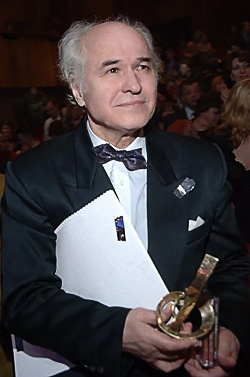You are here
Filmography
 Eugen Doga debuted as a film composer in 1967 by writing music for the film "Doorman Needed", directed by Gheorghe Vodă, based on the famous book "Ivan Turbinke". This fairytale needed a good interpretation, so the composer-beginner brilliantly coped with this challenge.
Eugen Doga debuted as a film composer in 1967 by writing music for the film "Doorman Needed", directed by Gheorghe Vodă, based on the famous book "Ivan Turbinke". This fairytale needed a good interpretation, so the composer-beginner brilliantly coped with this challenge.
From 1960-s to 1970-s Eugen Doga composed music to almost half of the feature films at that time filmed at the "Moldova-Film" studio. There was even a joke about renaming "Moldova-Film" into "MolDoga Film". In 1969 Eugen Doga composed music for such films as: "Wedding at the Palace" (Vlad Ioviţă), "Alone in Front of Love" (Gheorghe Vodă), "Ten Winters In One Summer" (Valeriu Gagiu) and a soundtrack to the animated cartoon "A Wallet With Two Coins"(Anton Matera).
We should also pay attention to special contribution made by Eugen Doga to the development of the animation of Moldova. He wrote music for such animated cartoons as: "Nanny-goat and three kids" (1968), "The Secret of LSU" (1974), "Guguţă’s Desk" (1975), "Guguţă-Postman" (1976), "Maria, Mirabella" (1980), "Children, the Sun and the Light", "Stop the Train"(1982),"A Rose Which Could Blush"(1982), and many others.
However, it was "Lăutari" (1971) that happened to be a real maturity test for the Maestro. This music was created on the basis of the glories of Moldovan folk music. Creative cooperation between director E. Loteanu and composer E. Doga started with this very film. The film "Lăutari" got the Silver Shell award at the San Sebastian International Film Festival (Spain, 1972).
The “Queen of the Gypsies” (1976) was the debut feature film of E. Doga at the "Mosfilm" studio. This film won the Grand Prix - the Golden Shell award at the San Sebastian International Film Festival (Spain, 1977). At the same time Eugen Doga works on the TV-film "Chisinau… Chisinau". He wrote a song "My White City" on the lyrics by V. Lazarev. The song became an anthem of Chisinau and it is played by the main clock on the top of the City Hall turret.
Time after time life puts various tasks before him.
The national manner and the style of music he creates are very diverse: Moldovan, Gypsy, Polish, Russian, Yugoslavian, Latin-American, Afghan, Ukrainian and Chinese. Eugen Doga got acquainted with Chinese folklore in details while working on the film "On the Murom Track" (1993), directed by F. Petruhin. Doga created the whole musical cycle in the Chinese style.
Such famous songs as "Moldovan Codri" (1968), "I Dreamed of the Patter of Rain" - on the lyrics by V. Lazarev (1975),"Spring - the Agemate of Love"- on the lyrics by I. Reznik (1977),"The Ballad About Tanya Savitcheva" - on the lyrics by V. Gin (1977), "Everything Begins With Love" - on the lyrics by A. Dementiev and many others, have become the musical chronicle of the history of Moldova and Russia.
Working with Polish directors B. Poremba and Moslyanovich, Eugen Doga was conceiving peculiarities of Polish music. Recently, the maestro has begun to compose music in the style of Russian romances. For this purpose the composer often used the Lefortovo music collection that holds unique samples of works in different fields, which have not been touched by a human hand for decades. This very collection facilitated composer‘s work for a film about the famous Russian singer Anastasia Vyaltseva and the folk poet Alexey Koltsov.
Eugen Doga’s famous waltz written for the film "My Sweet and Tender Beast" (1978) is his hallmark work. Nowadays this melody is daily played not only at marriage palaces but also in the subways, underground stations; it is often used by choreographers for ballet and dance performances, as well as by athletes - in figure skating, for instance. By the way, regarding the frequency of the waltz performance on the air and on the concert stages, it can easily be submitted to the Guinness Book of Records.
Speaking about Eugen Doga’s music in cinematography (and it is more than two hundred films for the moment), we can’t but mention a completely amazing feature of the Maestro - his music gives the viewers a full transcript of the situation occurring on the screen at the moment, his music is self-sufficient, that’s why we can watch the films with music by Eugen Doga without any translation. A perfect example of this is the music for the "Jamila" film which adds further credence to the unique abilities of the Maestro. All the melodies written by the composer for this film are an absolutely accurate hit to the theme of Central Asia.
Captivating "Doga motives" in "Jamila" make the Asian steppes even wider, emphasize the magic beauty of eternal snow-capped mountain peaks and the unique colour of green fertile valleys, which beautify the local landscape in such a fabulous way. But the Maestro creates a very different musical and amazingly true picture by telling the audience about the Central region of Russia - this is the music for the "Once Again We Need to Live" film directed by Vasiliy Panin and based on the works by Andrey Platonov.
Eugen Doga is the author of more than two hundred film soundtracks. The feature films, documentary films, animated cartoons and stage plays are available with the dates when the music was written by the composer.
All the dates are given as of the time of writing music by the composer.
Filmography (in the Russian and Romanian languages).
1997-2017 (c) Eugen Doga. All rights reserved.




